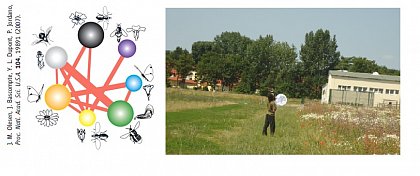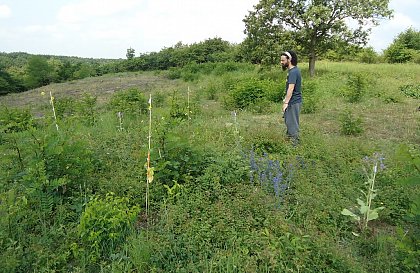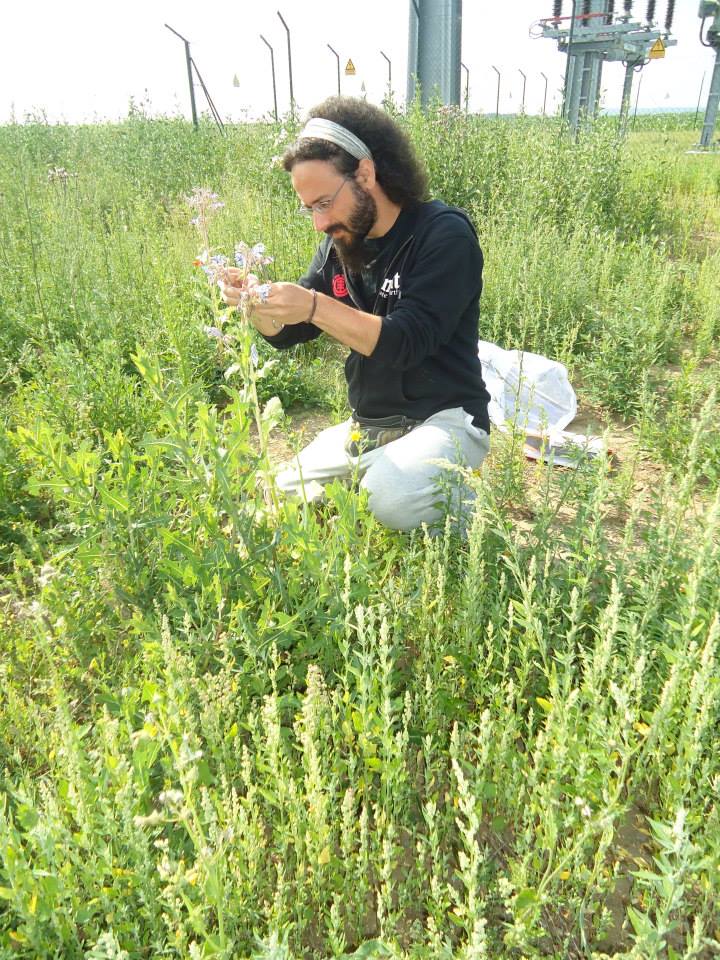Dr. Panagiotis Theodorou

Panagiotis Theodorou

For updated information please visit my personal webpage
Contact
Dr. Panagiotis Theodorou
room 6.10
Hoher Weg 8
06120 Halle (Saale)
phone: +49 (0)345 55 26511
panatheod@gmail.com
panagiotis.theodorou@zoologie.uni-halle.de
Research areas
My research investigates ecological and evolutionary processes from genes through species and ecosystems, to quantify global change effects on biodiversity, mutualistic interactions and the ecosystem service of pollination.
1. Insect biodiversity
Habitat loss, resulting from the conversion of (semi) natural to human dominated habitats is the most universal and high impact factor driving pollinator declines. Two of the main drivers of habitat loss, with overall negative effects on pollinator biodiversity, are agricultural development and urbanisation. Paradoxically though, studies have shown that anthropogenic habitats, including both urban and agricultural areas, can have neutral or even positive effects on pollinator diversity. Differences in intensity of land use change, spatial scale and the taxonomic group studied are among the main reasons for these contrasting findings. As a step towards understanding the overall effects of anthropogenic land use on insect pollinator diversity, I investigate the relative effects of local habitat resources, landscape composition and configuration on insect pollinator diversity, simultaneously measured as intraspecific genetic diversity, species richness and phylogenetic diversity.
In my research, I am using both traditional morphological taxonomy and metabarcoding to assess insect species richness and phylogenetic diversity of insects.
2. Insect evolutionary biology
There is increasing support that we are currently witnessing a 6th mass extinction of life on earth and humans are the driving force behind it.
The urbanization of Earth’s ecosystems is rapidly increasing and the global urban human population is growing with predictable changes in multiple aspects of the environment. For example, urban areas have increased air, water, light, and noise pollution, greater habitat fragmentation and loss, as well as more impervious surface compared to nearby non-urban habitats.
The urban environment is about as extreme as it gets, and the wild animals and plants that live side-by-side with us need to adapt to a whole suite of challenging conditions.
However, despite decades of research in urban ecology, the extent to which urbanization influences evolutionary change has received little attention.
My research focuses on understanding the demographic trends and genetic structure of insect species in the Anthropocene. Furthermore, I use RAD-sequencing to examine potential evolutionary responses of bumblebees to urbanisation.
3. Plant-pollinator interactions (networks)
Many studies have so far focused on the effects of anthropogenic habitat use on the diversity of pollinators and their host plants as well as on plant-pollinator community composition. However, the effects of land use change and local habitat on plants and insect pollinators are also likely to influence their mutualistic interactions, thereby impacting the architecture of their networks. The structure and complexity of these mutualistic networks could be important in promoting community stability and functioning.
In my research I investigate local flower visitation networks to examine how local habitat factors and the gradual change in dominant land use type from agricultural to urban in the surrounding landscape affect plant-pollinator communities and their interactions.

4. Host-parasite interactions
One of the major driver of ecological and evolutionary change is host-parasite interactions. Parasites can have a major impact on insects, controling population cycles,affecting fitness, mediating species interactions and structuring communities.
In my reseach I investigate the impact of parasites on host populations, their role in pollinator declines and their potential top-down effects on the ecosystem service of polination.
5. Pollination
Animal-mediated pollination is required for the reproduction of the majority of angiosperms and pollinators are therefore essential for ecosystem functioning and the economy. However, during the last decades, numerous reports have shown declines in numbers of both wild and managed pollinators.
Reasons for bee decline mirror those for biodiversity (species diversity) decline in general are : agriculture intensification (pesticides, fertilizers, mono-cultures), invasive species, spread of pathogens, habitat fragmentation degradation and reduction and climate change.
In my research I investigate the relative effects on the ecosystem service of pollination of: (i) biodiversity (species richness; genetic diversity and phylogenetic diversity), (ii) visitation rates, (iii) local habitat, (iv) land-use change brought on by agriculture and urbanisation as well as (v) the prevalence of pollinator parasites.
CV
2019- .Assistant/Associate Professor at Martin-Luther-University Halle-Wittenberg, Institute of Biology, General Zoology.
2013-2018: PhD in Biology at Martin-Luther-University Halle-Wittenberg, Institute of Biology, General Zoology, funded by iDiv (http://www.idiv-biodiversity.de )
2011-2012. Internship at Martin-Luther-University Halle-Wittenberg, Institute of Biology, General Zoology.
2008-2011. M.Sc. in Biology at University of Iceland, Faculty of Life and Environmental Sciences, Department of Biology.
2003-2008. B.Sc. in Biology at Aristotle University of Thessaloniki, Faculty of Science, School of Biology.
Publications
https://panatheod.wixsite.com/panagiotis-theodorou/publications
Memberships
Urban Eco Evo network associate
iDiv assoiate member
European Society for Evolutionary Biology
Genetics Society
British Ecological Society
Ecological Society of Germany, Austria and Switzerland (GfÖ)
Reviewer
- DFG (German Research Foundation)
- Luxembourg National Research Fund (FNR)
- Molecular Ecology
- Functional Ecology
- BMC Ecology
- Biodiversity and Conservation
- Biological Conservation
- Ecological Applications
- Sustainability
- Journal of Insect Conservation
- Landscape and Urban Planning
- Urban Forestry and Urban Greening
- Oecologia
- Frontiers in Ecology and the Environment
- Insects





